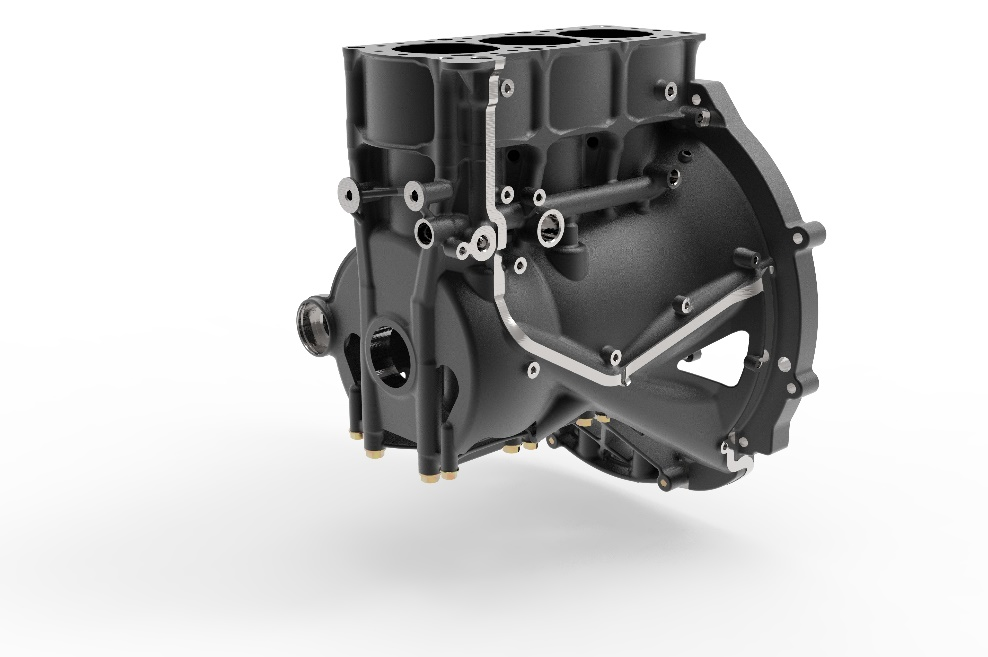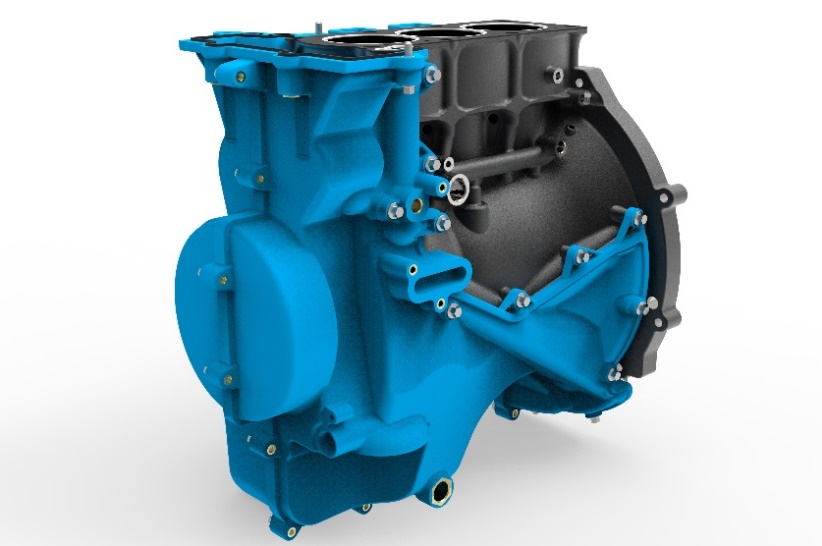Back
News
Tupy reveals cast iron petrol engine with same weight as aluminium at Vienna Motor Symposium
April 28, 2022
Building on more than 20 years of Compacted Graphite Iron (CGI) product development and series production experience, and in collaboration with SinterCast and Ricardo, Tupy introduces a revolutionary new concept for passenger vehicle petrol engines. Specifically developed for small in-line petrol, ethanol or synthetic fuelled engines as well as hybrid and range extender applications, the new concept combines the superior properties and life cycle CO2 advantages of CGI with an innovative design approach to deliver a cast iron engine with the same weight as aluminium.
 |
 |
| Using high-strength CGI with durable composite outer casings, Tupy redesigned the cylinder block of a current-production 1.2 litre three-cylinder aluminium petrol engine to establish a cast iron solution with the same performance and the same weight. | |
Compacted (Vermicular) Graphite Iron (CGI) has effectively become the standard series production material for heavy-duty cylinder blocks and heads, and for V-type passenger vehicle diesel engine cylinder blocks. However, CGI has not yet established a series production reference in the high volume in-line petrol engine sector that comprises the majority of the global passenger vehicle market.
With CGI series production capability on seven lines, and production of more than 100,000 tonnes per year of CGI cylinder blocks and heads, Tupy initiated a comprehensive development programme to demonstrate the potential benefits of CGI for in-line petrol engine applications. The development culminates with the formal introduction of the engine today, at the 2022 Vienna Motor Symposium.
The Cylinder Block Re-imagined
Beginning with a state-of-the-art series production 1.2 litre three-cylinder engine based on an aluminium cylinder block, Tupy re-imagined and re-designed the cylinder block. The running surfaces and structural areas were specified in high-strength CGI while the outer enclosures of the cylinder block were uniquely fabricated from low-density high-durability PA66GF30 plastic. The revised engine was simultaneously upgraded to a 48-Volt hybrid configuration to further demonstrate the potential of CGI in small petrol engine hybrid and range-extender applications.
The CGI cylinder blocks and ladderframes were produced under full series production conditions at the Tupy foundry in Saltillo, Mexico, incorporating state-of-the-art 2.7 mm nominal thin-wall technology, fracture-split main bearings and an industry-first for CGI: Grade CGI 550, with more than 550 MPa tensile strength. The introduction of CGI 550 provides at least 1.8 times higher tensile strength, double the stiffness and more than double the fatigue strength of the aluminium used in the original engine.
Benefitting from higher strength, the CGI alternative required 54% less metal volume than the original aluminium engine, increasing the crankcase breathing area by a factor 2.25-times. Modal analyses simultaneously showed that the global flexural modes of the CGI 550 block were 5% higher while the main individual bearing caps were 20-40% higher, due to the combined contributions of the material stiffness and the ladderframe design concept. Ultimately, the CGI alternative provided the same weight as the 48-Volt derivative of the original aluminium cylinder block assembly, finishing at 20.06 kg for CGI and 20.47 kg for aluminium.
The outer dimensions of the CGI cylinder block were intentionally maintained the same as the aluminium block, in order to allow components from the original aluminium donor engine to be assembled into the CGI engine for durability testing. The CGI engine successfully passed a 100-hour proof-of-concept durability test including operating periods at full load of 5,000 rpm and 183 Nm, providing parity for weight, performance and power density. While the carryover of the aluminium engine dimensions enabled the assembly of a running engine, it is estimated that a clean-sheet design approach would have enabled up to 5% of additional weight reduction for the new CGI design concept.
Widely studied in previous research, the production of cast iron has significantly lower CO2 emissions than the production of aluminium. In the specific case of passenger vehicle cylinder blocks, even with the favourable assumption of infinite recycling for aluminium, the benefit of cast iron can save 40% to 70% of the manufacturing CO2 emissions compared to aluminium, according to a publication at the 2017 Vienna Motor Symposium by Cranfield University.
“This quantum step in cast iron engine technology opens new opportunities for the future of the internal combustion engine in ICE, range extender and hybrid passenger vehicle applications. With the same weight as aluminium, and the inherent advantages of cast iron for improved mechanical properties, improved NVH, parent bore running surfaces and reduced cost, Tupy, Ricardo and SinterCast have established a new benchmark for small, in- line petrol engines” said Fernando de Rizzo, CEO of Tupy. “Environmentally, CGI cylinder blocks are more recyclable than aluminium and consume less energy than aluminium during the manufacturing phase. To provide a life cycle CO2 benefit, aluminium cylinder blocks must pay back the higher manufacturing energy by reducing fuel consumption during the on-road life of the vehicle. But when the cast iron engine is weight-neutral, the payback is impossible.”
“This project has demonstrated that there are still considerable benefits available from optimising the fundamental structure of a small ICE,” said Philip Hopwood, Head of Engines and Emissions Control at Ricardo. “The combination of the CGI material, casting technology and organic design and analysis process has reduced material usage and brought all important life cycle CO2 gains. The external plastic casing which incorporates much of the lubrication system and the timing case enables a new attribute balance which is not possible to achieve with traditional designs.”
“During the first meeting at Ricardo, the team agreed that decreasing the minimum wall thickness from 2.7 mm to 2.5 mm wasn’t going to excite anybody – and it also wasn’t going to provide a meaningful reduction in weight. We needed to re-invent the cylinder block, and we did” said Dr Steve Dawson, President & CEO of SinterCast. “In cylinder block applications, aluminium has the advantage of density and therefore weight. But everything else – strength, durability, tribology, NVH, recyclability, manufacturing CO2 footprint and cost – is a compromise. With this new concept, we ask the question: what if the cast iron cylinder block was the same weight as aluminium? It is an intriguing question, particularly for the next generation of compact, lightweight hybrid and range extender engines.”
For more information:
Tupy
dri@tupy.com.br
+55 (11) 2763 7844
 |
View the recorded Vienna Presentation Download the Full Technical Paper Experience the Augmented Reality |
About TUPY SA
Brazilian multinational that develops and produces structural components in cast iron of high geometric and metallurgical complexity. These engineering solutions are applied in the transport, infrastructure, agribusiness and energy generation sectors and contribute to people’s quality of life, promoting access to health, basic sanitation, drinking water, food production and distribution, and global trade. Its production is concentrated in Brazilian factories, in Betim/MG, Joinville/SC and Mauá/SP, and abroad, in the cities of Aveiro, in Portugal, and in Saltillo and Ramos Arizpe, in Mexico. In addition, it has commercial offices in Brazil, Germany, Italy and USA.
About Ricardo
Ricardo plc is a world-class environmental, engineering and strategic consulting company listed on the London Stock Exchange. With over 100 years of engineering excellence, we provide exceptional levels of expertise in delivering leading-edge and innovative cross-sector sustainable products and solutions, helping our global customers increase efficiencies, achieve growth and create a clear and safer future. Our mission is clear – to create a safe and sustainable world. For more information: www.ricardo.com
About SinterCast
SinterCast is the world’s leading supplier of process control technology for the reliable high volume production of Compacted Graphite Iron (CGI). The properties of CGI enable improved transport solutions, increasing efficiency and reducing carbon emissions in passenger vehicle, commercial vehicle and industrial power applications. As a specialist supplier of precision measurement and process control solutions to the metals industry, SinterCast also supplies the SinterCast Ladle Tracker® and SinterCast Cast Tracker® technologies, to improve production efficiency and Industry 4.0 traceability in a variety of applications. With 54 installations in 14 countries, SinterCast is a publicly traded company, quoted on the Small Cap segment of the Nasdaq Stockholm stock exchange (SINT). For more information: www.sintercast.com